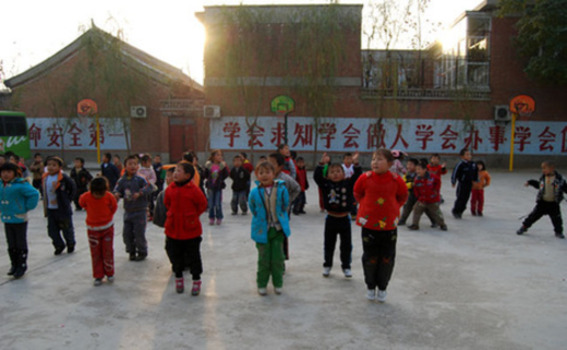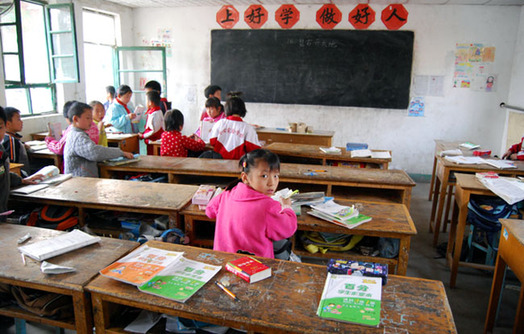By He Shan & John Sexton
China.org.cn staff reporters
|

|
|
Children of Tongxin Experimental School in Picun, a village near Beijing's Capital Airport, do after school exercises in the schoolyard. [John Sexton/China.org.cn]
|
It was an ordinary day at the Tongxin Experimental School for children of migrant workers, with students doing after-school exercises in the playground as their parents waited outside the gate to take them home.
Tongxin is a by-product of the current education system, itself in turn a legacy of the Chinese hukou system which, in various forms, dates back centuries but was strengthened by Mao Zedong in the 1950s in order to control migration from rural areas to cities.
Since the economic reforms of the 1980s, migrant workers have flooded into urban areas, but lacking local residence permits (hukou) they are usually excluded from social benefits in their adopted cities, including free education for their children.
Sun Heng, a former migrant worker, now a singer and social worker, raised 75,000 yuan in 2005 to set up Tongxin School on the site of an abandoned factory in Picun, a village near Beijing Capital International Airport.
"Migrant workers toil all year round, and want their children to get an education, so they can have a better life," Sun said. "That is why I decided to open the school."
The 3,000-square-meter school, with its run-down looking classrooms, schoolyard, cafeteria and dormitory, caters for about 400 children.
|

|
|
A classroom at Tongxin Experimental School in Picun, a village near Beijing's Capital Airport. The slogan above the blackboard reads "study hard, become a good person". [John Sexton/China.org.cn]
|
"Migrant workers are mostly from rural China and face discrimination in the cities. They are often treated as inferiors; and they do not have the same right as residents to public services, including the right to send their children to public schools," said Sun, who has been in Beijing for ten years without a hukou.
The Tongxin students pay 400 yuan per semester to keep the school financially viable. Yet even this relatively low fee is a deterrent that keeps many children out of school. Tongxin relies heavily on a few dedicated volunteers and around 20 young graduate teachers fresh out of college, most of whom don't stay long because of the low pay.
Ms Zhu, a petite twenty something from Guangxi Zhuang Autonomous Region, has worked in the school as a full-time teacher for a couple of months. "I came to Beijing with my boyfriend. He is at university in Beijing," she said. "I earn 800 yuan a month, which is just about enough to eke out a living."
"I love the children here, but I have to keep body and soul together. If I got another offer, I would jump at the chance to leave," she added. As she was speaking, several children ran over to say goodbye to her.
Beijing, home to 500 thousand of the nation's 20 million or more migrant children, has been considering proposals to enroll the children into public system but so far has failed to enact radical reforms.
Currently, there are about 300 schools for migrant children across Beijing. When students graduate, about one third return to their home towns to higher education, about one third enter technical schools in the capital, and the others just quit school to look for work.
"The Tongxin children are the lucky ones," said Sun, "Without this school, they would just run around the streets all day and get no proper education."
(China.org.cn, November 12, 2008)